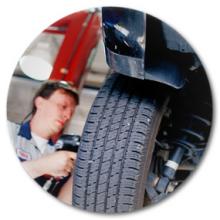Automotive
 Automotive fluids such as oil, grease and anti-freeze along with other harmful materials—like asbestos worn from brake linings and zinc from tires—significantly degrade water quality when they make it into waterways. Along with being an issue for public safety, these materials are detrimental to desert animals. If you are in the automotive industry, here are some things you can do to curb stormwater pollution.
Automotive fluids such as oil, grease and anti-freeze along with other harmful materials—like asbestos worn from brake linings and zinc from tires—significantly degrade water quality when they make it into waterways. Along with being an issue for public safety, these materials are detrimental to desert animals. If you are in the automotive industry, here are some things you can do to curb stormwater pollution.
- Storing Hazardous Waste: Keep your liquid waste segregated. Many fluids can be recycled via hazardous waste disposal companies if they are not mixed. Store all materials under cover with spill containment or inside to prevent contamination of rainwater runoff.
- Proper Disposal of Hazardous Waste: Recycle used motor oil and oil filters, anti-freeze and other hazardous automotive fluids, batteries, tires and metal filings collected from grinding/polishing auto parts. Contact a licensed hazardous waste hauler.
- Cleaning Auto Parts: Scrape parts with a wire brush or use a bake oven rather than liquid cleaners. Arrange drip pans, drying racks and drain boards so fluids are directed back into the sink or the fluid holding tank. Do not wash parts or equipment in a parking lot, driveway or street.
- Preventing Leaks and Spills: Place drip pans underneath to capture fluids. Use absorbent cleaning agents instead of water to clean work areas.
- Metal Grinding & Polishing: Keep a bin under your lathe or grinder to capture metal filings. Send uncontaminated filings to a scrap metal recycler for reclamation. Store metal filings in a covered container or indoors.
- Cleaning Spills: Follow your hazardous materials response plan, as filed with your local fire department or other hazardous materials authority. Be sure that all employees are aware of the plan and are capable of implementing each phase of the plan. Use dry methods for spill cleanup (sweeping, absorbent materials, etc.). To report serious spills, call 911.
- Washing Vehicles: Wash vehicles where the wash water can soak into grass, gravel or be diverted to nearby landscaping, away from the street and stormdrains. Wash vehicles at a designated wash rack that is connected to the sanitary sewer or take vehicles to a professional car wash. Use soaps, cleaners and detergents that are labeled phosphate free or biodegradable. The safest products for the environment are vegetable based or citrus-based soaps.




